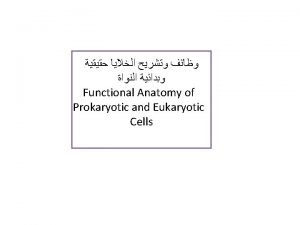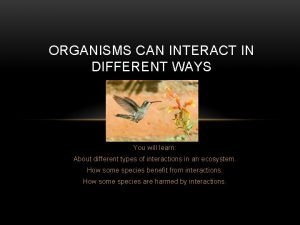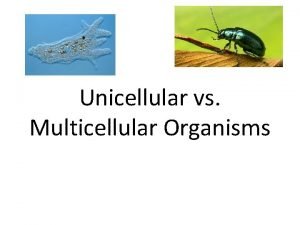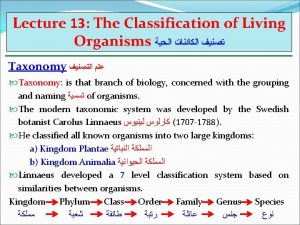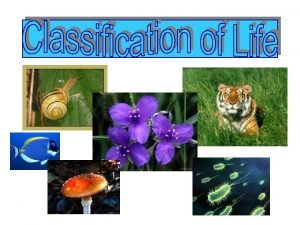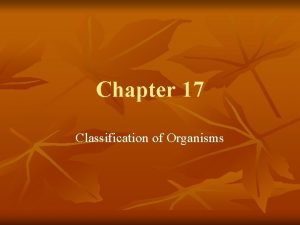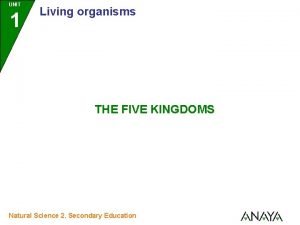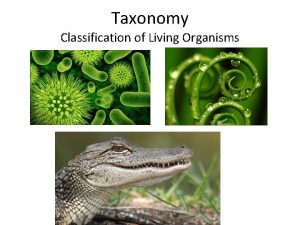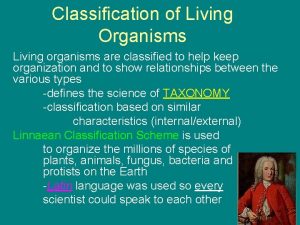The Classification of Living Organisms Taxonomy Taxonomy is










- Slides: 10

The Classification of Living Organisms

Taxonomy ﻋﻠﻢ ﺍﻟﺘﺼﻨﻴﻒ Taxonomy: is that branch of biology, concerned with the grouping and naming of organisms. The modern taxonomic system was developed by the Swedish botanist Carolus Linnaeus (1707 -1788). He classified all known organisms into two large kingdoms: a) Kingdom Plantae b) Kingdom Animalia Linnaeus developed a 7 level classification system based on similarities between organisms. Kingdom Phylum Class Order Family Genus Species ﻣﻤﻠﻜﺔ ﺷﻌﺒﺔ ﻃﺎﺋﻔﺔ ﺭﺗﺒﺔ ﻋﺎﺋﻠﺔ ﺟﻨﺲ ﻧﻮﻉ

Linnaeus classified species as the smallest unit. Species is a Latin word meaning “kind” or “appearance” Differences between species based on: a) Morphological differences ﺍﺧﺘﻼﻓﺎﺕ ﺷﻜﻠﻴﺔ b) The potential to interbreed ﺍﻟﻘﺪﺭﺓ ﻋﻠﻰ ﺍﻟﺘﺰﺍﻭﺝ with each other in nature to produce fertile offspring ﻧﺴﻞ ﺧﺼﻴﺐ Robert Whittaker in 1969 proposed five kingdoms: 1) Kingdom: Animalia ﻣﻤﻠﻜﺔ ﺍﻟﺤﻴﻮﺍﻥ 3) Kingdom: Fungi ﻣﻤﻠﻜﺔ ﺍﻟﻔﻄﺮﻳﺎﺕ 2) Kingdom: Plantae ﻣﻤﻠﻜﺔ ﺍﻟﻨﺒﺎﺕ 5) Kingdom: Monera ﻣﻤﻠﻜﺔ ﺍﻟﺒﺪﺍﺋﻴﺎﺕ 4) Kingdom: Protista ﻣﻤﻠﻜﺔ ﺍﻟﻄﻼﺋﻌﻴﺎﺕ

Binomial nomenclature ﺍﻟﺘﺴﻤﻴﺔ ﺍﻟﺜﻨﺎﺋﻴﺔ Developed by Carolus Linnaeus. Binomial nomenclature consists of two names: § The first name is the organism’s genus § The second name is the organism’s species What rules are used to write scientific names? 1. The first letter of the genus is always capitalized. 2. The first letter of the species is always lowercase. 3. Scientific names of organisms are always italicized or underlined. For example, Linnaeus assigned to humans the scientific name Homo sapiens, which means “wise man ”ﺍﻹﻧﺴﺎﻥ ﺍﻟﻌﺎﻗﻞ.


First: Kingdom of Monera ﻣﻤﻠﻜﺔ ﺍﻟﺒﺪﺍﺋﻴﺎﺕ All the organisms of this kingdom are prokaryotes. This means all cells do not have nuclear membrane. They are unicellular organisms The kingdom is divided into two groups, a) Bacteria and b) Archaea. Monera exist in habitats that are too cold, too hot, too salty, too acidic, or too alkaline.

Classification of Kingdom Monera Based on Mode of Nutrition ﻃﺮﻳﻘﺔ ﺍﻟﺘﻐﺬﻳﺔ 1) Autotrophs ﺫﺍﺗﻲ ﺍﻟﺘﻐﺬﻳﺔ 2) Heterotrophs ﻏﻴﺮ ﺫﺍﺗﻲ ﺍﻟﺘﻐﺬﻳﺔ a) Saprophyte ﺗﺮﻣﻢ b) Parasitism ﺗﻄﻔﻞ c) Symbiosis ﺗﻜﺎﻓﻞ i) Mutualism ii) Commensalism ﺗﻌﺎﻳﺶ ﺗﻘﺎﻳﺾ

Autotrophic bacteria: bacteria which prepare their own food. Heterotrophic bacteria: bacteria which are dependent on other organisms for their food. Parasitic bacteria: bacteria obtain their food from the tissues of living organisms (host) and cause harm to the host. Saprophytic bacteria: bacteria obtain their food from dead organic matter. Mutualism: a relationship between individuals of different species in which both individuals benefit. Commensalism: a relationship between individuals of different species in which one organism benefits without affecting the other

A) Bacteria can be classified by shape into Bacillus ﻋﺼﻮﻳﺔ , Coccus ﻛﺮﻭﻳﺔ or Spirillum ﺣﻠﺰﻭﻧﻴﺔ. Different types of diseases are caused by bacteria include: cholera, many sexually diseases, and certain types of food poisoning However, more bacteria are beneficial. o Bacteria in our intestines o produce important vitamins. o Bacteria recycle CO 2 and other chemical elements between organic matter and the soil and atmosphere.

B) Archaea can be classified into: a)- Halophiles ﻣﺤﺐ ﻟﻠﻤﻠﻮﺣﺔ live in saline waters (high salt concentrations) as the Great Salt Lake and the Dead Sea. Some species require an extremely salty environment to grow. b)- Thermophiles ﻣﺤﺐ ﻟﻠﺤﺮﺍﺭﺓ live in hot environments (hot springs). The optimum temperatures for most thermophiles are 60 - 80°C.
 Pyramid hesd
Pyramid hesd Modern classification of living organisms
Modern classification of living organisms Competitive interaction
Competitive interaction Unicellular vs multicellular
Unicellular vs multicellular Organisms taxonomy
Organisms taxonomy Binomial nomenclature consists of two names *
Binomial nomenclature consists of two names * Organisms taxonomy
Organisms taxonomy 8 major levels of classification
8 major levels of classification Taxonomy in biology
Taxonomy in biology In the hierarchy of classification which grouping
In the hierarchy of classification which grouping Five kingdoms science
Five kingdoms science

